#but also food for thought
Explore tagged Tumblr posts
Text
LAST TWILIGHT AND READING THE SUNSET – VISUALS, OPTICS AND ENDINGS IN BONDAGE TO THE BAHT

Last Twilight aired its final episode on Friday 26 January 2024, and the response on BL Tumblr to how things wrapped up (at least among the majority of BL watchers whom I follow) has been a lot of head-shaking disappointment, if not exactly full-on hatred. Without the bittersweet touches we've come to expect from Director Aof as counterballast for his trademark uplifting sentimentality, the ending came across as unforgivably sappy and sugary-sweet for many of us.
And I found myself agreeing with a lot of the criticism being flung at Last Twilight – for the ardent Noppharnachionados accustomed to more nuanced, thought-provoking output from Director Aof (Moonlight Chicken comes immediately to mind) the final episode of Last Twilight (and especially the fourth instalment, Part [4/4]) felt very boxer-gloved, rushing to hit its marks but then only clobbering bluntly at the surface, never venturing deeper and lacking subtlety at every turn.
But I've been giving it a once-over, because it's a little surprising to me that Khun Noppharnach (who's such an expert at his craft) could land quite the dud that some, including me, were so uncharitably calling Last Twilight.
And I now think – as Khun Noppharnach has done so many times before – he may very well be trolling us again. Because on my rewatch, I'm finding that the narrative holds certain clues that Director Aof was possibly quite conscious of what he was doing with Ep.12 of Last Twilight. On closer inspection it's a whole lot cleverer than it seems (maybe a bit too clever for its own good) – but it does require much sign-reading though (and caveat: I'm not a trained or professional tea leaf reader!). 🤷♂️
Anyway, after a speed-run rewatch of the 12 episodes (just skimming the surface really, so forgive me if I overlook anything) I've decided I need to reconsider a lot of my preliminary judgement about Last Twilight's final episode (and the series in general). I now think it actually does satisfy on a number of levels (even while it continues to disappoint on so many others). But because of work and other commitments though, this post is very late (still, better late than never I guess!)
I'm not wanting to spend too much time on the text and subtext, because it's the metatextual level of Last Twilight (what this BL says about BL) that intrigues me the most. But this is going to be a super-long post anyway.
In many ways Last Twilight was a departure from Director Aof's usual work, and the most obvious was its return to the structure and content typical of a traditional romance drama. Khun Noppharnach had actually moved away from this in his output over the past few years (once again, Moonlight Chicken is the paragon of examples; Bad Buddy nodded at this, if only to subvert it and signal to us that Khun Noppharnach was attempting an overhaul of LGBTQ+ depictions in the BL industry).
Some background to start things off – BL, including Thai BL, owes a lot to het romance dramas that set the archetypal framework early on, and early BLs often followed that inherited formula very closely (I think SOTUS and Together with Me fit this bill).
Painting with the broadest of brushstrokes, a stereotypical (het) romance drama can usually be expected to structure its narrative according to the following:
The meeting of the protagonists, usually a fraught mix of attraction and friction;
They go on a journey of falling in love with each other (and we get to watch along);
A major conflict arises to test their love and commitment;
They triumph over the conflict and end up happily ever after (most of the time) or are overcome by it (and the love story ends tragically, some of the time).
As a lot of romance stories are targeted at women, typically the female protagonist in a het romance drama is the center of attention, and the story is told from her point of view as well.
And because of their het predecessors, early BLs also tended to depict their couples with a masculine/feminine framing (which could also be spun out into a dominant/submissive and/or active/passive dynamic – the dreaded seme/uke binary).
Director Aof took a wrecking ball to all that with Bad Buddy (upending the structure, subverting the conflict, dispensing with seme/uke), and his works have since veered toward more-rounded LGBTQ+ drama, centered around romance, but forgoing the stereotypical structure and beats of more traditional romance dramas.
But if you think about it, Last Twilight actually hews quite closely back to the original template.
For example, Mhok is a big, scruffy ex-convict and mechanic, stereotypically masculine – the proverbial seme – while Day is slighter, younger and a Mama's boy (despite what Night says at Ep.10 [2/4] 16.24) leaning into uke territory.
The structure was pretty traditional as well:
The early entanglements of Mhok and Day were a mix of antagonism and attraction;
They went on a journey of falling in love with each other despite their differences, that we were allowed to witness – we had "masculine" Mhok losing his heart to "feminine" Day first, with the seme then pursuing his grumpy uke (a tsundere?) and subjecting us to plenty of swoonworthy Aaaaw moments as Mhok piled on much tenderness, care and affection;
The major conflict that tested their love and commitment was actually Day's questioning of Mhok's motivations, leading to their rupture in the clichéd Episode 11 of Doom;
They triumphed over the conflict after Mhok returned and demonstrated that he'd grown and learnt his lessons in meeting Day's less visible needs – not very convincingly though (and I think this is one part where a lot of us feel extremely let down by the narrative) – but it was enough to sweep Day off his feet once again, and they got their happily ever after.
There was some padding in the middle (including the obligatory out-of-town tourism jaunt – I'm convinced BLs that do this receive grants from the Tourism Authority, and in Last Twilight we were treated to a sojourn in Songkhla). The show really had to work stretching things out over 11 episodes (which was why, for me, the pacing started to drag in the second half). But overall I think the structure of Last Twilight marks a faithful return to BLs (and het romances) of older times.
With regard to characterization, Day rendered progressively hapless and helpless as his vision declined made him easy to read as a damsel-in-distress, the object of savior-knight Mhok's affections and ministrations. It's thus also unsurprising when we were shown more of Day's point of view than Mhok's (just as we usually get to see more of a heroine's interior journey in traditional het romance dramas than her romantic foil's). Last Twilight was nodding at the past once more, asking us again to view it through the lens of an old-school (BL) romance drama.
A lot of romance dramas also tend to be intellectually lightweight – some are pure sentimental, throwaway indulgence – and if we place Last Twilight somewhere on the less demanding end of the spectrum, it's a more than serviceable example of the genre and has in fact more heft than most. (I was expecting it to land more in queer drama territory as has most of Khun Noppharnach's work, and the fact that it only half did contributed a lot to my sense of disappointment at the end.)
But as a lighter piece of trad BL fluff, Last Twilight did punch above its weight class very often. And all of the discourse around vision and Day's increasing blindness was the early tip-off to one of its weightier, central themes – that of seeing and being seen in the light of one's truth.
As his vision faded, Day found himself subject to his greatest fear – of being seen as less than his truth, especially when by all accounts he had been a storied and admired athlete prior to his visual debilitation. Day was still the same person despite his loss of vision, and he was painfully reminded of this fact every time those around him forgot it. Last Twilight deftly showed us that his early snark and cynicism were a brittle defense against being seen as nothing more than an object of pity, the ghost of his former self (which is what Mee/Me in the novel Last Twilight was also about).
There are many examples of this, e.g., when he avoided his friends after blindness set in, and his meltdown at the party they threw him after a rapprochement (Ep.6 [3/4] 20.12, when it became clear they viewed him as a weakling in need of rescue at the first sign of trouble, inferior to his previous incarnation as an athletic champion). The story arc with August's feigned romantic interest was also another of Day's nightmares coming true, being exactly the sort of innocently insulting and unconsciously condescending treatment he was trying to avoid.
And of course this was the reason behind his break-up with Mhok in Episode 11, when he sensed that Mhok's care and concern were in part tied to a notion of Day as being less than whatever the nebulous concept of "normal" was in his head. (For context, Mhon and Day have an exchange about the meaning of a "normal" life for Day at Ep.10 [2/4] 7.35), Mhok talks about Day wanting to be "normal" at Ep.11 [1/4] 10.22, and Mhon reminds Day of his wish to be "normal" at Ep.12 [3/4] 16.29). Despite – or maybe because of – how objectionable the word may be, I think Last Twilight is inviting us to question our ideas about it too.)
So a large part of Day's story arc involved him overcoming his own hang-ups and dealing with how he was seen by the world around him, to stand in the light of his own truth (as a proud member of the differently abled community).
Mhok's character also had a parallel journey. Excluding those who knew him well, society refused to see beyond his rough-hewn persona (and his prison background too, it must be said). His options in life were thus limited by how he was always seen as an outsider, and subjected to othering because his presence was invariably associated with negativity, risk and harm.
But as Mhok demonstrated time and again, his truth (that for the longest time only Porjai and maybe Rung could seem to see) was far less violent and menacing than what was read by the people around him. And his character's journey toward self-actualization in Last Twilight was to arrive at a life truer to his inner self, noting that what we see at the beginning of the series is Mhok trying valiantly to live up to his ruffian image, prone to fights and aggression. With this, it's possible to read that Mhok himself was unable to comprehend fully his own inner impulses, and it was only his time as caregiver and later faen in Day's life that opened his eyes to living out his more nurturing, other-focused energy within (and that must have served him well too, in his later career as a chef crafting dishes for others to enjoy).
In contrast to Day, whose struggle was also about being seen for his truth while cast (by others) in a negative light, Mhok chose to align himself with whatever role the world put him in (whether it was a rabble-rouser mechanic, a straight boyfriend to Porjai, or a guardian to the infantilized Day) whereas Day chose to reject any outsider-determined identity outright. And Mhok failed at his roles mostly because they were inauthentic to his truth, except for his time as Day's caregiver. For the first time there Mhok's failure was different, not because the caregiving recognized his own truth (coming from kindness and softness within) but because it did not recognize Day's truth (as his approach to taking care of Day still perpetuated the invalidation of Day's wholeness as a person).
Mhok and Day's names are also a quiet hat tip to this – with Mhok's name (หมอก, that means fog or mist) also a metaphor for how visibility of the truth behind his amorphous self was obscured for the longest time, while Day's name (actually the English word day, with all its connotations of light and clarity) is a metaphor for how he was clear about his own truth and identity from the start, but needed to be seen correctly, undistorted by any filter of shame or pity.
However, GMMTV's commercial insistence on pair branding worked somewhat against the characterizations – my read is that Day was probably written as much more fragile in appearance (belying the tough athlete that he really was beyond surface impressions, and explaining the tendency of his friends, family and caregivers to want to infantilize him post-blindness). As an aside, badminton is one of those sports that forgives a certain delicacy of frame, as it rewards lightness and agility more than brute strength on the court. Meanwhile Mhok was (I think) written as this big beast of a man whose appearance would scare off all but the most foolhardy, meaning that his innate kindness and sensitivity would remain unseen by most.
Unfortunately Sea is built pretty sturdily as an actual badminton athlete (and he's tall as well) while dermatologist Jimmy is just too porcelain-skinned and delicate-featured pull off any convincing evocation of physical brutishness. Pity, because the pair do have chemistry and their acting was mostly credible in Last Twilight (especially from Sea, who brings an easy and natural charm to his portrayals).
Anyway, I can suss out two visual metaphors in the series that illustrate the ideas described above. But as the analysis of these metaphors is also long, I've moved it all away into its own post linked here: The Fishtank and the Flowers. I found both metaphors to be fascinating (the goldfish aquarium, as well as the pairing of the jasmine with the sunflower), but it was the blooms especially that took me by surprise (when it became clearer which was assigned to Mhok and which to Day). 🤩
So while we're on the characters though, here's an aside about the criticism of how Mhok was treated by the narrative and the outrage surrounding his apology at Ep.12 [2/4] 10.55. Yes, he had been a selfless caregiver and a caring lover, but there were also numerous examples of him treating Day as less than an adult with his own agency, doing to Day what August, Mhon and the replacement caregiver (Assistant Director Meng Chaiyapat's extended cameo, at Ep.10 [2/4] 0.27) had done, by controlling the playbook and removing Day's choice and say in matters directly related to his own life. Some examples of where Mhok fell short:
Pretending not to find the copy of Last Twilight in the Chatuchak secondhand bookstore, gaslighting Day into believing it was his own discovery (Ep.3 [3/4] 9.41) – you might lie to a kid about Santa Claus (and I'm divided about that), but nevertheless Day was not a kid and should not have been treated like one.
Lying about Night's involvement in their plan to see Mount Veha (Ep.8 [1/4] 17.34) – more gaslighting.
Going back on his word and telling Mhon and Night about Day winning the dancing garland (Ep.11 [4/4] 7.35) – this was just plain disrespectful, especially after Day had shared his mixed feelings about the "win" (Ep.11 [4/4] 1.45).
Taking advantage of Day's blindness to prank him (Ep.11 [3/4] 7.32 and Ep.11 [4/4] 3.38) – unless Day liked surprises (of which I see no sign) laughs derived from exploiting someone's vulnerabilities are never to be lauded (please don't jumpscare the blind, people).
And the ultimate – lying about the job offer in Hawaii, which was the last straw for Day (Ep.11 [4/4] 10.51).
All the above might have come from a place of love, motivated out of the goodness of Mhok's heart – but even if they were meant to uplift or support Day, his actions were all disrespectful (even damaging) to Day's own agency and personal situation as someone struggling with visual disability.
In this light (pun intended) I had to re-think my judgement of Mhok's apology to Day in Ep.12, because he did need to learn to care for Day on terms acceptable to Day as well, and not have expected him to give that up just because he needed care.
Now because it's Khun Noppharnach, it will always be possible to give a queer reading to his work. So Day's dread at being seen as less than what society perceives as "normal", and Mhok's struggle with his status as the feared and misunderstood "other", can both be read as stand-ins for (some parts of) the LGBTQ+ experience, where full acceptance of the queer minority has yet to become the norm for most, if not all, societies. But I guess that should be obvious to all by now.
Anyway, there's a whole lot more burbling within Last Twilight that can be explored at length, but as I've gone on too long already I'm simply going to mention them here and then skip on:
The novel Last Twilight that features so prominently everywhere within the series (that not-so-coincidentally shares its name) is rich with significance as a parallel to (and comment on) Mhok and Day's own story, especially with Mee/Me's struggle to be seen in a world often blind to her presence.

Day becoming increasingly unseen as the neverending night of blindness became his defining identity is mirrored by Mee/Me needing to step away from darkness in order to be seen by the world around her (and her light-chasing is also a parallel for the sun-seeking of the sunflower, Day's totemic bloom, and in that way another metaphor for Day's reliance on external validation – see this write-up linked here for more elaboration on that aspect of Day's personality).
Day's blindness was not at all the first time Khun Noppharnach has used a form of health-related affliction as a metaphor for the queer condition, highlighting the parallels of the LGBTQ+ experience with the social model of disability. Other examples of this in his work include Heart's deafness in Moonlight Chicken, Tian's and Med's heart conditions in A Tale of Thousand Stars and He's Coming to Me respectively (the latter maybe less so though) and Pran's obsessive-compulsive disorder in Bad Buddy.
Also in He's Coming to Me, Med's predicament as a ghost subject to all sorts of constraints in the world of the living, as well as his invisibility to those insensitive to his situation, was a parallel with Last Twilight's theme of being seen for your true self even as the wider world imposes restrictions on you, and is similarly an allegory for the LGBTQ+ experience as well.
Last Twilight's ideas about seeing and being seen correctly were also touched on (somewhat briefly) in Bad Buddy, in the discourse around Ink's camera, photography and Pat/Pa's contact lenses.
Mhok's journey was milestoned with numerous examples of the food = love trope, in which he could be seen giving of himself through the creation of dishes and meals for others.

(above) Last Twilight Ep.11 [2/4] 0.39 – Mhok's gift of Black Chicken Soup (��ุปไก่ดำมา) to Porjai is but one of many examples in the series of him showing his love to others through his cooking; in this instance Black Chicken Soup (made by double-boiling silkie chicken with medicinal herbs) is a traditional Chinese preparation, warm and comforting, that is considered particularly nourishing for moms newly post-partum and is also popular in Thailand for the same reason
This is paralleled also by Mhon and her career as a chef (especially when she ladled soup out for her ex-husband in Ep.12, which is a bittersweet Noppharnach touch with reams of cultural backstory – but that's fodder for another post though).
And Assistant Director Au Kornprom's cameo as chef-de-cuisine in Singha's hotel continues a meta-level portrayal of his role in BL as some sort of leader, instructor, teacher or creator with a select group as the intended beneficiaries of his work (see these links here and here for other examples).
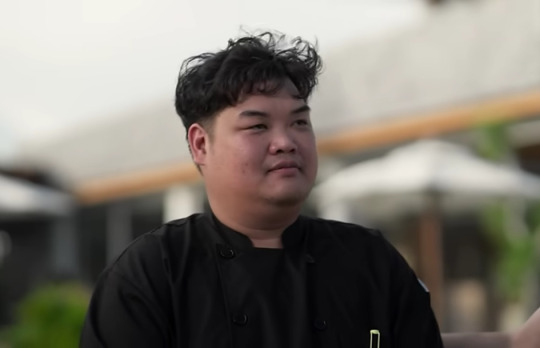
(above) Assistant Director Au Kornprom Niyomsil pops up in a cameo as Chef Tom in Last Twilight Ep.11 [2/4] 9.47
I think Director Aof is announcing that Khun Kornprom is his designated successor as the next generation BL director at GMMTV who will (perhaps) be carrying on a measure of queer activism within his own output.
And that brings me to what I think Last Twilight might be saying on a metatextual level.
What I'm going to be babbling on about here reaches not only into Last Twilight for some clues as to its comments about the wider BL industry, but also to some messaging in Khun Noppharnach's earlier (though still recent) work, because I think it all does come together to paint a picture of some significance.
In the names and chromatic metaphors of Moonlight Chicken (see this link here), Director Aof signaled that unseen persons in authority were increasingly making their political presence felt, especially where financial motivations were concerned (caveat: I think this is a reference to power play within GMMTV and perhaps the BL industry itself, not a comment on the wider political scene in Thailand).
And Director Aof's various cameos in MLC (written up here) as well as its themes of generational renewal and the struggles to leave the past behind, also seemed to be messaging that some of this conflict between artistic/activist directions and commercial considerations were possibly taking a personal toll even as he continued his career within the BL industry.
I would have left it at that, but then when the Our Skyy 2 x Bad Buddy x A Tale of Thousand Stars episodes had their turn on our screens in 2023, it became clear that Director Aof was saying something quite forcefully about the telling of queer stories in the media, especially in situations when queer people have less control over the narrative (as is the case with Y-series churned out by commercial studios for mass market consumption; see this write-up here for the analysis).
So based on the above together, this is my read of the situation.
Khun Noppharnach has been signaling that because of the profit motive, queer creators in the BL world are under increasing pressure from higher up to return to more commercially-lucrative storytelling, perhaps in the form of more stereotypical romances the way Last Twilight was structured. (Whether this pressure is from within the producing organization or from the wider political sphere I do not know nor wish to speculate.)
As a consequence, QL shows are being made to veer away from recounting stories that are authentic to the LGBTQ+ experience (which was the warning embedded in Our Skyy 2 x Bad Buddy x A Tale of Thousand Stars), dialing back content that speaks with a queer voice to queer people (though of course non-queers are welcome to watch along, because after all a good story is a good story).
If the above is true, then the tidal pull of commercial goals may soon be dragging more output back toward the more romanticized imaginings of same-sex love seen before in formulaic (but arguably more profitable) BLs of old, with an emphasis on catering to mass market demand (largely represented by – whether rightly or wrongly – marketing perceptions of the cishet female teen gaze).
And all of this circles back to Last Twilight, which is an example of this return to the past, and perhaps explains in part why its ending feels so unsatisfactory for a lot of us.
I'm very much convinced at this point that the finale (with its hated timeskip, Mhok's spiffed-up but stagey return, his emotionally hollow reconciliation with Day, and especially all the schmaltzy vignettes post-couplehood part deux) is but a conscious reaction to political gameplay from echelons above. For Last Twilight, I'm sensing (guessing?) that Director Aof and his team were coerced not just to stay faithful to the traditional formula of BLs past, but also to shove in an unmitigated Happily Ever After for the branded pair of JimmySea, without any of the hallmark Noppharnach countercurrents to undercut the sweetness (or else).
And perhaps in a burst of inspired-slash-malicious compliance, the team took on the mandate for the HEA and ran with it, churning out a saccharine, nutritionally-deficient lump of candy and unceremoniously tacking it on as the ending of what had otherwise been a fairly measured and self-aware BL from the start. And it really sticks out – but I think it was meant to.
I may be misreading the tea leaves again, but to me the signs of the above are myriad. Here's some of what I think Director Aof is telling us about Last Twilight's subversion of the ending, embedded within the narrative and visuals:
Master Aon's name is signaling (to me at least) a parallel with Director Aof's name (Aon/Aof, On/Off, Onscreen/Offscreen, get it? 😆). He even has a similar look, with his wispy mustache, earring and floppy hair.

Noting that Aon was a respected, good-natured guru who'd already trodden happily the path that Day was on, this reads like a rendering of Director Aof's own role (that I'm tempted to say is self-defined, though it's my own reading really) as a queer elder imparting the wisdom of his own experience to younger queer people viewing his work. (Also, both Aon and Aof are gurus of BL who've had their vision stolen from them.) And if Kruu Aon was recommending acolyte Day to read the novel Last Twilight for the metaphorical lessons within (we were reminded of this many times: see Ep.3 [2/4] 9.08, Ep.8 [4/4] 1.07 and Ep.9 [4/4] 9.26), I think Kruu Aof is recommending that we look at the series Last Twilight more closely as well to learn of something similar.
Last Twilight the series is full of references to endings. And if the novel Last Twilight has been signaled as the roadmap to Director Aof's thinking behind the series, the missing last page and epilogue in Day's copy suggests that ��� just like the book version – Last Twilight the series is actually (and deliberately) open-ended.
But the messaging doesn't just stop there. We are also called upon to manifest the ending we want (if what we're presented with doesn't meet our expectations). For example, Mhok hated the ending of Last Twilight the novel (although Day liked it –see Ep.9 [4/4] 13.23). And he then conflated this with his disappointment at the lackluster twilight on Mount Veha as well.
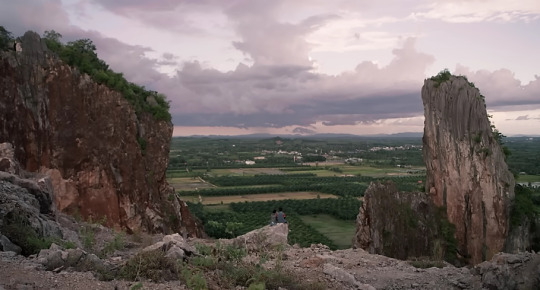
But through the power of imagination Day helped Mhok see the beauty of the sunset there (Ep.9 [4/4] 16.28) – on one level it's a trite "Life is what you make it" sort of statement, but on another it also reads like a call to action ("You can change what you don't like"). And I like to think it also embodies Last Twilight's theme of recalibrating your own way of seeing things, and looking beyond surface visuals to find the truth that speaks to you (which, in a sense, is what I'm doing now, hah!). But when applied to Last Twilight at a meta level – I think we're also being reminded that a picture-perfect ending (such as Last Twilight's Ep.12 [4/4]) can also hide the reality of gloomy clouds behind the artifice overlaid by human intervention.
Another sign that the ending of Last Twilight deserves a closer look is all the flapping about between innkeeper Cherry, Mhok and Day around the missing last page of Day's book in the Ep.9 [4/4] scene starting at timestamp 2.38.

(above) Last Twilight Ep.9 [4/4] 3.11 – Cherry tears out the last page of her copy of the novel and forces it on Mhok and Day
I'm putting in a detour for a closer look at Cherry here. She was the unsentimental custodian of her father's guesthouse, with a personality that blew hot and cold (like the weather in the south, referenced at Ep.9 [4/4] 2.12). The guesthouse seemed comfortable enough, although Mhok found it less than welcoming (Ep.9 [3/4] 6.39). And Cherry herself was also a strange mix of brusque and friendly. She was more concerned about cash than MhokDay's lack of shelter at Ep.9 [3/4] 7.36, but warmed up to them later when they explained their Mount Veha quest (allowing them to stay, treating them to a musical evening with her guitar, and accepting the payment deferral). She preferred the old way of doing things (cash only, no online transfers) and had once hosted David, the author of Last Twilight the novel, at the guesthouse.
Based on the above, I'm thinking that Cherry is a representation of Director Aof's dual role at GMMTV, where he is both a creative (director and sometime screenwriter) as well as part of management (senior director of content production, at time of writing). And in Last Twilight we see this duality acknowledged both in Cherry's mercurial double nature, as well as in the capricious weather of Songkhla. The guesthouse, on the other hand, is a representation of GMMTV itself. On the management side, Director Aof has to make and/or implement decisions on behalf of the company even though it isn't really his (just as Cherry runs what was once her dad's). GMMTV is warm and hospitable enough to the performers in its stable, but as a commercial enterprise it has to prioritize financials above most (if not all) other considerations (symbolized by the guesthouse's paradoxically comfy yet unwelcoming air, and also Cherry's indifference to MhokDay's cashless plight). Director Aof's creative focus is the arts (represented by Cherry's musical interlude) but GMMTV itself prefers the old ways of making money, i.e., old-style BLs (and this is symbolized by the guesthouse unwilling or unable to explore new ways of collecting rent with no online transfers). And just as the guesthouse hosted David, whose bittersweet ending to Last Twilight the novel wasn't satisfying to salt-of-the-earth Mhok (standing in for the tastes of the mass market), GMMTV also hosts under its roof Director Aof, the auteur behind Last Twilight the series (whose original ending I suspect may not have pleased other GMMTV bigwigs in management, and who then enforced a change). Some of this is illustrated in part by the scene just before Mhok and Day departed from the guesthouse. When Mhok and Day asked Cherry to keep her autographed copy of the novel, she instead tore out the (signed) ending from her book and thrust it into their hands. And when Day asked if it had a happy ending – she jokingly tried to grab it back, saying "Find the ending yourselves." To me this is a metaphor that the original ending of Last Twilight the series is actually unknown to us, and the ending we got was forced into the narrative from the outside (because it's what the fans want, according to GMMTV speaking in Cherry's voice at Ep.9 [4/4] 3.15 – "I think it's more important to you than me"). And it has official sanction too (symbolized by the author's signature), indicating that Director Aof (David in another incarnation) may not have had a choice (since we're shown that the author's stamp of approval was artificially inserted into a different book instead). It also suggests (in the "Find the ending yourselves") that Director Aof was aware of how that artificial transplantation was going to be negatively received by some diehard Noppharnach fans, and he's saying to us – "Take the ending that's been given you", but at the same time "Find your own meaning in it".
And then Day tells us in no uncertain terms basically the same message, at Ep.12 [4/4] 3.37 ("We were made to discover our own preferred version of the novel’s finale").
The narrative actually tells us quite boldly in the first part of Episode 12 that we can expect the finale to start unraveling because of outside interference – I actually think this is the message behind Director Aof's cameo at Ep.12 [1/4] 10.01:

Mocked up as a hotel porter, Director Aof offered a guiding hand to Day – but at timestamp 10.06 Mhok suddenly inserted himself into the scene in an act of direct supplantation:

(above) Last Twilight Ep.12 [1/4] 10.06 – Mhok steps in and supplants hotel porter Aof (he of the white gloves)
To me this was unambiguously signaling that from this point onward the proceedings would no longer be under the guiding hand of Khun Noppharnach. In addition, hotel porter Aof's gloved hands were pure white, unbesmirched and free from stain, conveying the message that Director Aof was innocent and blameless of the plot shenanigans that were to follow. To underscore the point, we were then shown Day taking a misstep under new (non-Aof) guidance at Ep.12 [1/4] 11.20:

(above) Last Twilight Ep.12 [1/4] 11.20 – Day stumbles without hotel porter Aof's guidance, even as Last Twilight the series begins to falter
This was jarringly out of tone, given Day's confidence in his life as a blind person, as well as Mhok's previous – and very conscientious – stint as caregiver to Day the first time around (he would instinctively stand between Day and any physical risk, and place a protective hand over protrusions that Day might bump his head on, for example). The message from this visually dissonant moment is that we should expect the ending to stumble as well, without Khun Noppharnach guiding the process.
So what can we make of the ending with this in mind? I can live with the timeskip, Mhok's return, and the eventual reunion of our main pair. These are all somewhat expected beats in a standard romance drama – and if that's what Last Twilight is setting itself up as, I won't begrudge it the tropey hallmarks that some do love (though I do think some parts could have been handled better). I even liked the airport run for all of its brash, silly sentimentality (yes, Love Actually is one of my favorite films).
But where I think Last Twilight really falls off a Veha cliff is when it starts lobbing at us a plethora of candy-sweet dreams unrealistically brought to life, one after another, in Ep.12 [4/4]. We have:
Ep.12 [4/4] 0.51 – Surprise! Day can see;

Ep.12 [4/4] 1.18 – Multiple scenes showing Day rejoining the world of the sighted, enjoying activities that were once denied to him (like reading and badminton) both alone and in the company of loved ones;

Ep.12 [4/4] 4.01 – Family time! Mhok introduces Day as his partner to his deceased family at their memorial niches, and then we see Mhok very much integrated into Day's family (signified by his pasta dish receiving chef Mhon's stamp of approval) even as we see Night and Porjai joyfully announcing another imminent addition to the numbers;
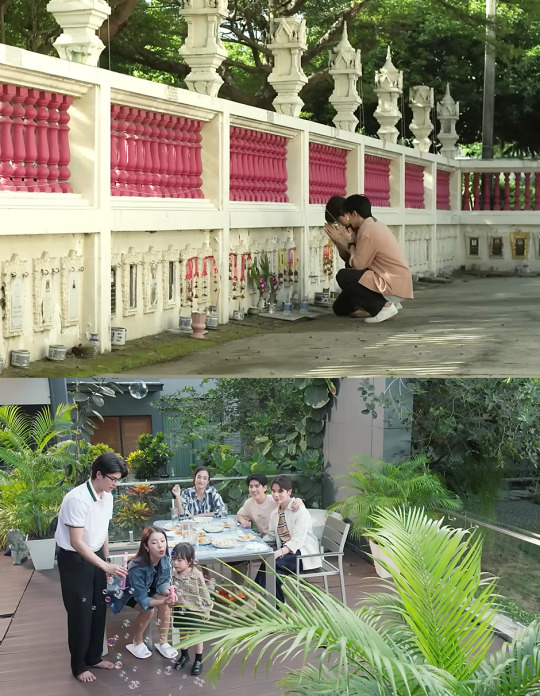
Ep.12 [4/4] 8.06 – Mhok and Day get a Mount Veha do-over, talk about the novel's ending and then act out the ending to their own love story.
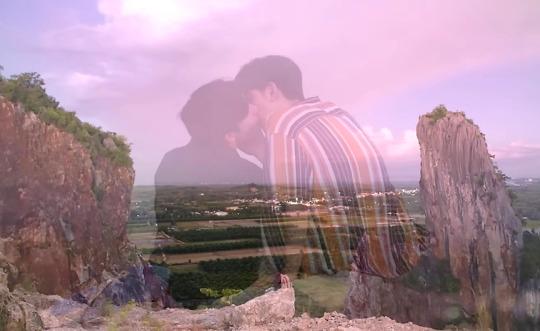
It's all just too, too fairytale, with happy news piled atop happy news, and just reeks of artificial sap and fakery.
But that's just it – I think that Director Aof and team were actually faking it. Remembering that the novel Last Twilight's full title is Last Twilight: Until the Last Light Goes Out, take a look at how each of the above little snippets of happiness is finished off – each draws to a close with its own Fade-to-Black.
Now the Fade-to-Black is a device borrowed from theater – in a stage play snuffing the lights for a few minutes of total darkness allows scenes to acquire a sense of separation, completion and closure while giving the crew time to change the sets. But here in Last Twilight it feels like we're being pitched happy ending after unrelated happy ending, each competing with the previous in the too-good-to-be-true stakes.
In the title of the novel, we're told to hold on until the last light goes out. Just when is that last light exactly though? There are so many here that each Fade-to-Black begins to feel not just like closure, but like a little death each time. (Also pertinent to note: MhokDay's kiss under that glorious sunset at Ep.12 [4/4] 13.26 gets replaced by a sky of gray clouds instead at Ep.12 [4/4] 13.37.)
Director Aof is really hammering home his point that traditional Happily Ever Afters in romance stories can be shallow and unsatisfactory, and is making us miss the trademark melancholy that propped up the wistful sentimentality in the closing scenes of his previous works.
However, much of the above is what Last Twilight is saying about Last Twilight.
At the metatextual level, what the show is communicating about BLs as a whole is even more somber. I think Director Aof is messaging that for the BL industry to head toward a happy, satisfying ending (if it really is being pushed down to lowest common denominator levels by commercial interests), it's up to us the viewers to manifest that and make it happen (just as Mee/Me and Day did for their own stories). How this might be done, I do not know. Lobbying GMMTV perhaps? Complaining ever more loudly about what this did to Last Twilight when it could have been so much more?
I rather suspect that unfortunately our numbers may not be sufficient to bring about change – the majority of Last Twilight fans actually seemed to like the final wrap-up and its fairytale ending (at least based on the reviews I've seen on MyDramaList). It's only among the more adult (and dare I say it – discerning?) viewership here in the BL sphere on Tumblr are we seeing more robust critiques of the series, mourning the greatness that could have been.
Last Twilight was a good BL all the way up to Ep.12 I think. And then it looks like we were purposely let down, to make a point about BL endings. As always, Director Aof is having the last laugh – and he lets us know this during the end credits.
For it's then that we see the various photographs that were taken by characters throughout the series but never shown to us before (it's strangely moving, and makes me think of the ending to Cinema Paradiso when Salvatore finally gets to view the priest's cut in one long montage as a final gift from Alfredo beyond the grave).

(above) The end credits of Last Twilight, replaying the scenes where the characters were photographed, alongside the images captured in the moment that hitherto were not shown to us
It's in the ending that we're finally getting to see the director's point of view (and hidden message) from his vantage point behind the camera, just as we're only getting to see those photographs (that were originally unseen by their subjects, and privy only to the one taking the photograph) right at the very end.
And the final shot? We get the whole cast and crew making the "span" gesture (that an almost-sightless Day used to approximate the distance at which he could still make things out visually, before his vision left him totally).

It's a loving salute to Last Twilight for sure, but can we perhaps detect a hint of mockery in the way it also resembles the Forehead-L for Loser gesture from the 1990s? Or a hint of a threat in the way it looks like a gun cocked and pointing? The gesture is also Thai sign language for the letter ล, which is somewhat the equivalent of the letter 'L'. And with so many 'L's or 'ล's in that shot, it's making me think of 'LOLOLOL' and also ลล standing in for ล้อเล่น/laaw len, which means Just kidding.
Is it all just a coincidence? I wouldn't put it past Aof for it not to be. But whatever it all means, I really do think he's having a hearty (if somewhat bitter) last laugh. 😔💖
#last twilight#mhokday#aof noppharnach chaiyahwimhon#reading the signs#of seeing and being seen#this is a bit of a clown post 🤡#a whole lot of speculation#and maybe some retconning#but also food for thought#finding my own version of the ending
29 notes
·
View notes
Text

he doesn't like the height difference btw
#the height difference is embarrassing to him. he should be menacing! and tall! so people don't want to talk to him!#he's also just very easily flustered#we love him for that <3#xandraws#food for thought au#fnaf#fnaf sb#fnaf security breach#security breach#fnaf au#dca au#dca fandom#fnaf sun#sun fnaf#fnaf moon#moon fnaf#dca sun#sun dca#dca moon#moon dca#dca y/n
1K notes
·
View notes
Text

monologue
#they said i couldnt have a worse speech bubbles to image ratio and i said 'bet?'#isat spoilers#in stars and time#in stars and time fanart#isat fanart#isat siffrin#isat loop#two hats spoilers#isat#lucabyteart#sifloop#not rlly but it gets the tag in case ppl r backscrolling my tags on my blog for some reason#anyway this dialogue has been kicking around in my files for about 2 months as it is known to do & i wanted to play with typesetting#'write a fic if you like words so much' absolutely not . what if it was pictures instead. and also i wanted an excuse 2 loop gradient#but yeah uhhhh this is very . very loosely the result of me thinking about the 'island is trapped in the fucking future' theory.#like if so. would it just like. reappear. when the rest of the world catches up w where it was stuck in time. like . 20 more years on.#and thus the q: god wait at what point would sif be older than the age they last knew their parents to be. theyre nearly 30 now so like.#you can see my logical path thru these thoughts yes? anyway i think its fun when these two put their braincells together to realise#the horrors. and kind of exclusively the horrors. wahoo!!!#anyway food for thought re: island reappears and to the islanders it's not been any time at all. but its been like 30 years for the rest#fuck do you do: your boy returns 30 years older plus a family (maybe even a child) and minus . a fucking eye.#also theres a fucking angel with them? update. thats also your boy what the fuck. wait fym theyre married. hold on. wait--
2K notes
·
View notes
Text

i am. so sorry
#I DONT THINK I WANNA TAG THIS AS MY ART#dream smp#quackity#also i’m sorry i was gonna draw him eating white ppl tacos but that would have taken too long#and chili mango was just the first easy-to-draw food i thought of#way less iconic though
958 notes
·
View notes
Text

[Day 358]
💥💥💥💥💥💥💥💥💥
#dddaily4sherin#hgcz roleswapverse#pearlescentmoon#geminitay#grian#goodtimeswithscar#hgcz spoilers#< technically#hermitblr#trafficblr#isdoodles#character design is so HARD#there are many thoughts behind these designs tho many ill unleash them someday#🫵💥#reiterate ARGHRHRGHE HEAD IN MY HANDS CHARACTER DESIGN#btw also check out the roleswapverse tag theres a lot of food‼️💥‼️💥#*MAYBE ill unleash. man i cant edit im on my phone </3
2K notes
·
View notes
Text

Cooking up an older Clervie outfit design so I don't have to keep drawing her looking like her child self but Long
#genshin impact#clervie#ngl i have so many thoughts about an older clrv's design but at the same time artistically im not that creative </3#mostly tried to make her look more like a direct contrast to arlecchino's design (which was already present but we ignore that)#cause arle's design is mostly very sharp and angular while i'd imagine clervie's being much more rounded out and softer#like they are the round vs pointy cat meme in human form#the hair was really tricky cause on one hand much like everyone else we dont really keep the same hairstyle our entire lives#butttttt at the same time idk i feel like her long hair flowing down (and her headband) are very recognizable parts of her#so i decided to not change much (also cause i dont trust myself making multiple drastic changes without changing their identity too much)#also halfways through coloring I realized she's kinda giving crucabena outfit wise but we ignore that </3#anyways clervie would def be a support/healer character if actually playable (leaning more towards buffer support imo)#ITS A MASSIVE 50/50 IF SHE WOULD BE A HYDRO OR ANEMO USER but i decided hydro for the time being cause it compliments HOTH's dpses more#aka Arlecchino Lyney and partially Freminet since if i remember correctly he's more physical based but cryo nonetheless#i just really like the idea of Clervie's passive being along the lines of boosting stats/dmg if there's HOTH members present in a team#anyways sorry for the text wall I just really need to be kicked out of the kitchen#i am UNDERCOOKING the food#character design is not my passion </3
2K notes
·
View notes
Text
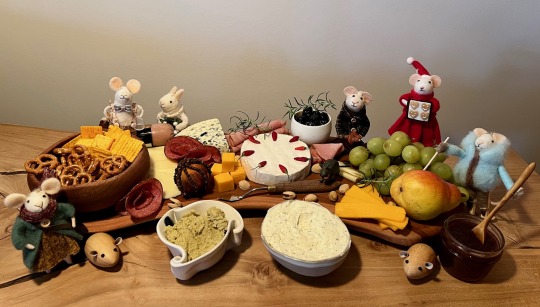

The Charcuterie Board, as designed by your votes! Thank you to everyone who participated; this was a fun challenge!
#charcuterie saga#The original version of this was a watercolour but unfortunately I left it behind while travelling...#Along with some of my comic pages and my scripting notes (that's why I have yet to post more pd-mdzs...I funked it up big time)#This board was made on Dec 30th and I am very thankful to the people who helped donate various components to make it possible.#I took a few variations on the composition and while this one has some flaws - I think it has the most personality!#True Charcuterie fans will look at my choices and weep but I never promised good charcuterie!!! I promised accuracy to the poll!#Some elements stand in as 'double counting' in categories. Which was a survival technique for me.#I had to learn a lot of new things to make this possible! My skills like in making the physical wooden board - not the arrangement of food!#Rosemary was hotly debated as I personally do think it counts as edible (so not a valid pick for 'decoration').#I also thought tomato sauce could count as a fruit and spread.#My cursed hand has fingerprints in other parts of this tragedy. Beware looking too closely.#Of course there is a version of reality in which I have the disposable income to buy 20+ different kinds of cheese and-#-make this baby absolutely massive. Not the reality I live in though.#What a wild experience this saga has been. So many opinions about cheese (and other foods).#EDIT: I mislabelled the Salami! There is salami on the board!!!
689 notes
·
View notes
Text




Lovers Surprised by Death (1510) by Hans Burgkmair the Elder Nosferatu (2024) dir. Robert Eggers
#nosferatu#nosferatu 2024#nosferatuedit#horroredit#perioddramaedit#fyeahmovies#filmedit#robert eggers#lily rose depp#nicholas hoult#films#🎬.mp4#the gothic imagination#some dread chord#myedit#this looked better in my head but i just really liked the looming shadow hands yk. anyway. evil username moment yay#there was also an interesting note about the woodcut by the cleveland art museum recording that#the costumes and pose of the woman resembled antique representations of daphne fleeing apollo. food for thought!
423 notes
·
View notes
Text

i've been spoiled with the overwhelmingly positive feedback on the last piece, have another one that i can't seem to get right with colour
#call of duty#ghostsoap#simon ghost riley#john soap mactavish#vif#thank you so so much for the feedback by the way :))#i am beyond touched. you all are loved#i sincerely hope you enjoy this one as well!#also food for thought! no scars on soap in this and for once it's not because i forgot hehe
847 notes
·
View notes
Text

my attempt at making a fursona
#i never see any mole furries so i thought id try my hand at it ^_^#i was hungry making this and was thinking of dirt cup pudding so its partly inspired by that and mario grass blocks#i dont draw furries very often so this was a fun learning experience lol. also!! star nose moles are kinda cute!!!!#when i was coming up with a name my mind kept going back to that tiktok of dogs and the tts voice saying stuff like i like mulch#mulch is my favorite food! yippee mulch!! so if youre wondering where i got the name theres the lore for it#i also wanna make a sea otter fursona.. and perhaps a snowshoe hare or other winter animal. oh or a barn owl!!#im trying to free my mind when it comes to making multiple sonas bc im still trying to wrap my head around it#ive always kinda seen myself as my persona but i want to try and be silly with it. actually while i was making this i was a little doubtful#to call it my fursona bc it doesnt look like me but a little voice inside my head was like well. youre not a 5 foot tall talking mole eithe#so you might as well. and i was thinking abt ppl with their dragon wolves with wings and i was like wow.. youre right... i can do what i#want forever. and brother that shit was enlightening it was like my third eye opened when i realized that#my art#myart#my oc#oc#fursona#mulch#furry art#sfw furry#character design#oc ref sheet#reference sheet
3K notes
·
View notes
Text
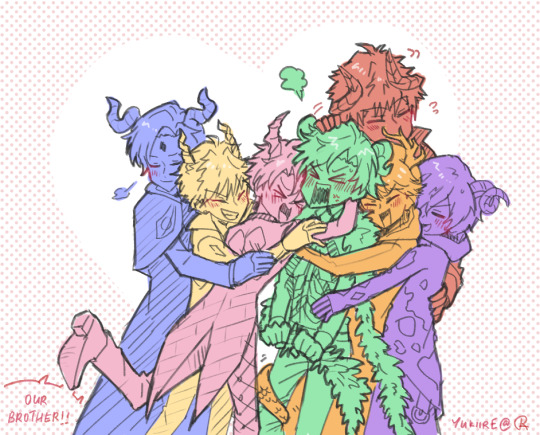
it's time to give the 4th but also newest bro a big hug 💖
#we already knew they were gonna pick satan in NB's lesson 19 anyway but i love how they got there#obey me nightbringer#obey me#obey me fanart#obey me mammon#obey me lucifer#obey me asmo#obey me satan#obey me leviathan#obey me belphegor#obey me beelzebub#obey me shall we date#riddle doodle#it also makes me wonder how they got to being bros in OG and makes me wonder if they got to do the same things as NB's#food for thought idk how to think
7K notes
·
View notes
Text
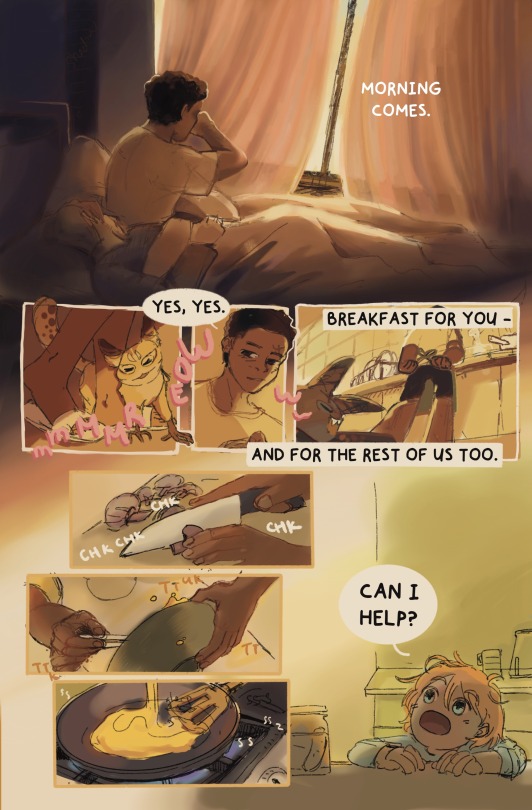
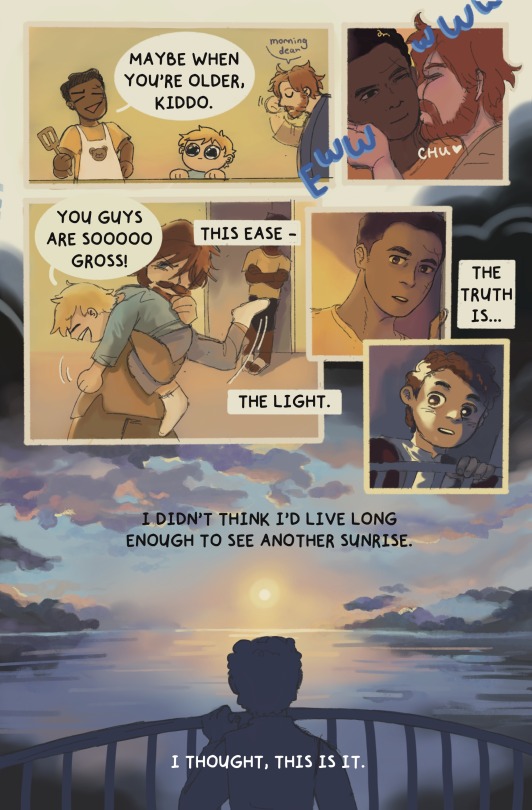
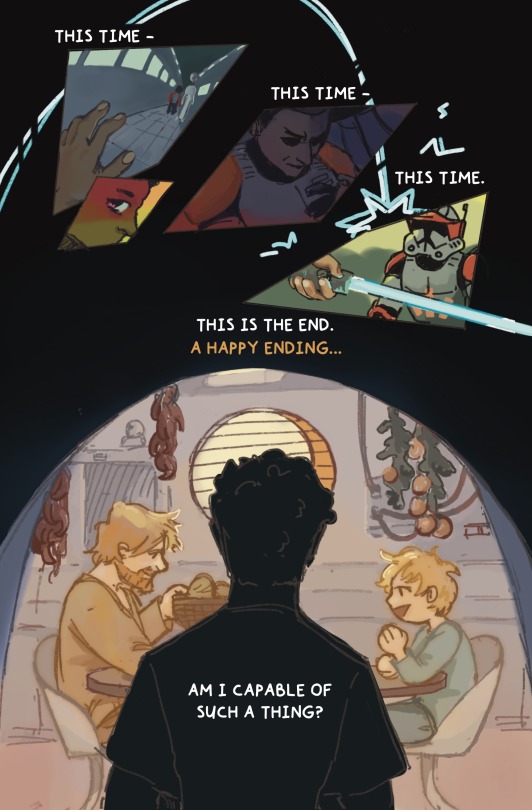
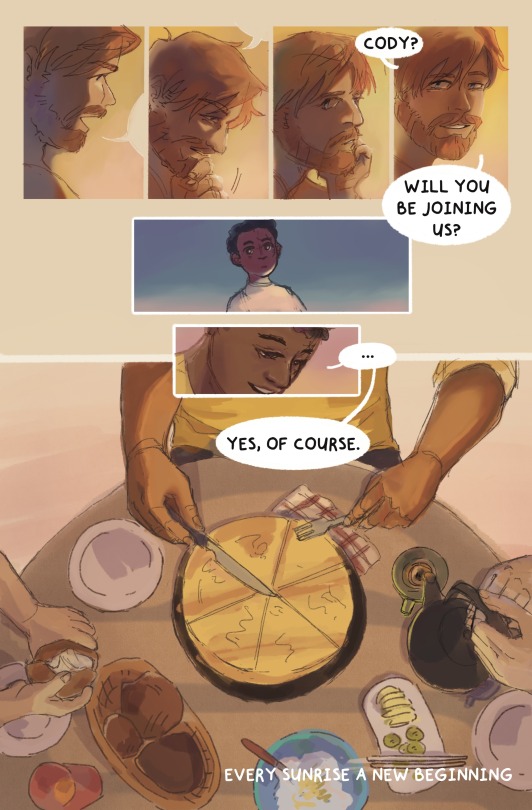
my piece for @thecodywanzine! thanks to the mods who let me go completely ham and cheese on this bad boy. this one's about living longer than you ever expected and not knowing what to do with it
#they're having a leftover sale with free shipping if you want a ridiculous amount of art and merch for an insanely low price#codywan#commander cody#obi-wan kenobi#star wars#comics#codywan zine#i went kinda nuts with the sun symbolism on this one. even i feel like its hamfisted but like listen am i not going to self-indulge#if not in a shipping zine piece then where#hope and love and the sun and etc can be an. omelette. spanish omelette specifically. that you share with your fambly#food cw#its also about looking at your best friend over a table and going. i lvoe you. i love you. i want to spend the rest of my life with you#i want to see the future with you. im so glad we're both alive even though i thought we'd both be dead by now#bytebun draws#lets not talk about the way there is zero consistency in my art style. <3
3K notes
·
View notes
Text

introducing my new dca au: Food For Thought AU
Y/N is a journalist who recently got a hotel in salt lake city, utah to investigate some disappearances nearby; normally they wouldn't cover things like this (they aren't even sure it's legal), but utah seems to have a history of disappearances, and by god if they weren't curious. they know it's dangerous but these crimes have been unsolved for at least a few years (to their research), so they hang out near the location of the crimes: a nearby cafe.
Sun (and Moon, not pictured) are cafe staff at a nearby cafe to the hotel Y/N is staying at. sun does most of the customer interactions, and moon does more of the actual making of drinks and food. they seem to be aware of the murders at their cafe, but don't seem to know anything about them... but Y/N plans to keep asking, in case something comes up.
sun's new design and moon's design here!
#these designs are NOT finalized and will most likely change. i.e. im not happy with sun's design so he'll probably go through a few changes-#-before i officially start MAKING the au#ALSO I WOULD HAVE DRAWN MOON BUT BY THE TIME I GOT ANY IDEA FOR HIS DESIGN I WAS ALREADY ALMOST DONE WITH THIS#IM SO SORRY MOON FANS YALL WILL GET YOUR FOOD SOON#food for thought au#xandraws#fnaf#fnaf au#fnaf sb#fnaf security breach#security breach#fnaf sun#sun fnaf#dca y/n#dca fandom#dca au#also that is NOT all the tags i could put on this but my brain is blanking rn
597 notes
·
View notes
Text

ok now is the time where i admit that alighterwood got into my head and now i have a batfam rewrite au plotline sitting in my outline drafts
#please do not repost my art guys#saw someone reposted it on insta and was disappointed#and if anyone wants to draw these designs please tag me#both because i wouldn't be bothered and would love to see it#i spent so long on these designs#also i just really love the name pheonix for jason#and you can pry it from my cold dead hands#but i will come back from the dead#ala jason todd#is that how you do the ala?#a la?#hm#food for thought#erinwantstowrite#jason todd#jason todd au#pheonix#jason todd pheonix#tim drake#but make him#tim wayne#damian wayne#damian al ghul#robin! tim#but he's not robin here#robin! dami#sun bird tim!#sun bird#i also REALLY love sun bird for tim#red bat dami
746 notes
·
View notes
Text

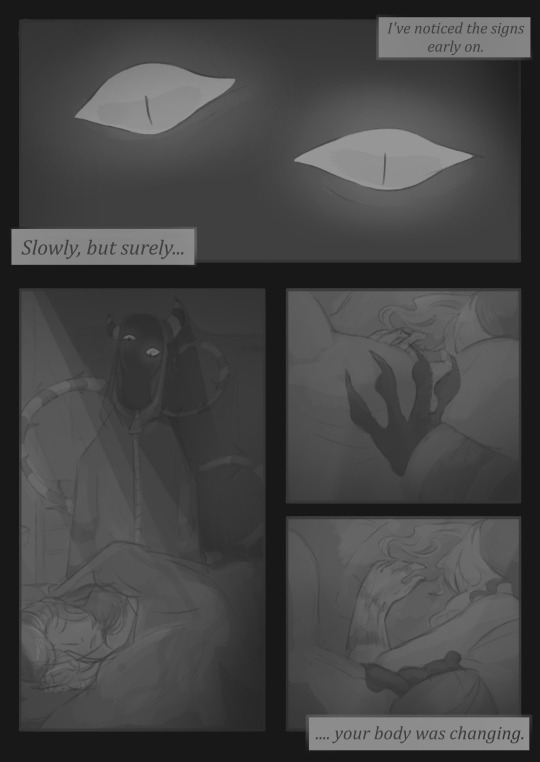
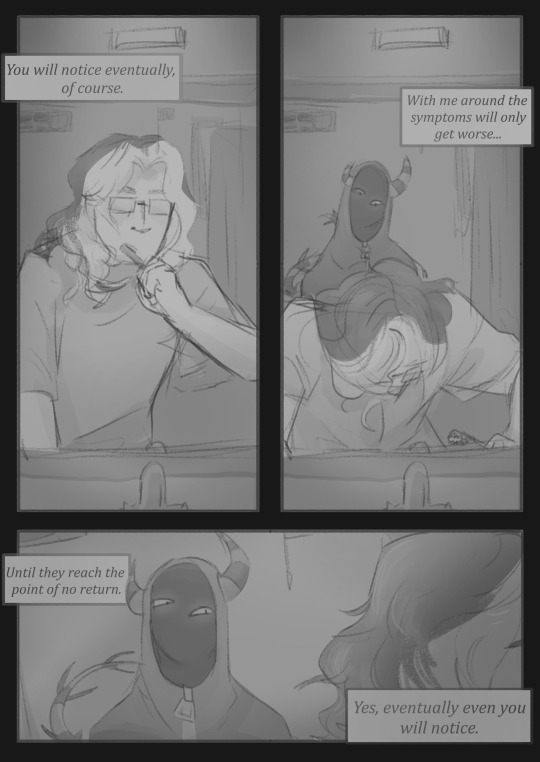

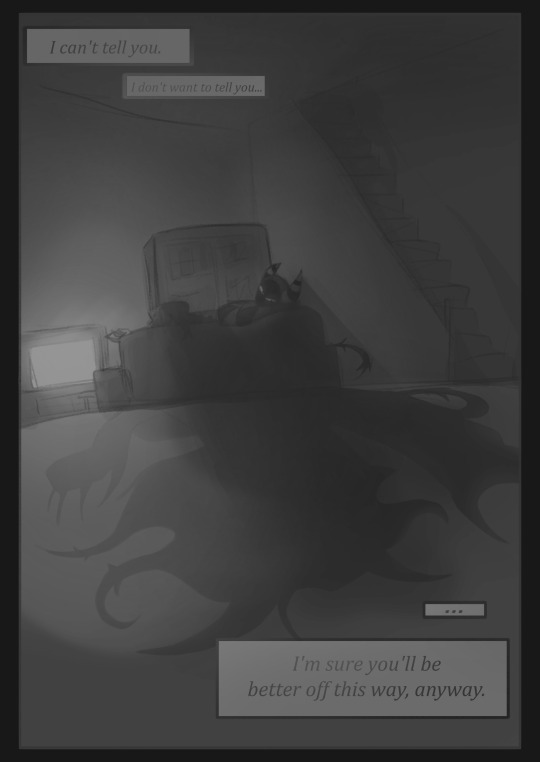
Selfish.
#hellooo doai sitcom au community#im no masterful comic artist but this idea has been spinning in my head like rotisserie chicken#basically what if clyde knew about alex becoming a veldigun and could stop the process by simply staying away from them#but decided not to cause (whether it likes it or not) they're it's first friend in a loong while (while also being useful)#clyde's moral compass definitely isn't perfect after all#i dunno... food for thought..#doodlesoup#doai#dreams of an insomniac#doai sitcom au#doai clyde#doai alex williams#i dont like the last page tbh but its probably fineee#oh yeah also clyde wants to keep the house bright so alex doesnt notice vision changes + the fact that their eyes are kiind of glowing
451 notes
·
View notes
Text
L can be such a possessive character at times. he always strikes me as the type of person who is deeply aware of everything that he owns, both in a more literal sense and metaphorically-- like, he knows what money he has and how to use it, what resources are readily available to him and what he has to be sneakier to utilize, the habits and tendencies and emotional states of individuals and world governments both. the DN musical really puts an emphasis on the more computer-y aspects of how his brain functions, which isn't as obvious in the manga/anime but i think still works well as a way to follow his thinking. it's kinda what near does too: everything is a factor to them, every tiny detail a new opening to optimize for the best results, every person and location and object a part of a puzzle waiting to be solved. and as a part of that, L is deeply aware of every and any little thing he may or may not have control over, and exactly to what degree.
his habit of stealing titles as depicted in the LABB murders novel is such a good example of this. ryuzaki, eraldo coil, deneuve. he eats people alive and then takes their names for himself like some kind of fucked up fae or trickster god, creating new masks and personas to hide behind from the remains of the people he's devoured. i have to wonder if he would've used the title of KIRA for himself had he won-- i can hardly imagine what kind of power such a title could hold if held in his hands. of course, he could've just used the defeat of KIRA as a way to build up the L title even further, offering up the body of a dead god like perseus showing off the head of medusa. but L is so emotionally attached to the kira case, i struggle to see him allowing it to fade from existence so thoroughly as near does, even if it is only kept close on a private level...
this is part of why i think it genuinely makes a lot of sense that L's ultimate win state would include capturing light to some degree. even if the memory of KIRA somehow manages to fully disappear from the public consciousness, there is no fucking way L is letting light yagami out of his grasp. honestly, the moment that L truly loses this game is not when he starts investigating misa while still under rem's watch, not when light gets back his memories, not even when he dies, but the moment when he allows light to be freed from the handcuffs. the moment when he allows the other members of the task force to turn off the cameras and keep him from watching light and misa talk in the lobby. the moment when he gives up, lets light yagami go outside of L's personal sphere of control, is the moment when L starts the clock ticking down to the end of his own life.
this is one of the key ways in which i see light as a true equal and parallel to L, as after L's death he, intentionally or no, continues the same tradition and takes L's title for himself, twisting the two sides together into the L-KIRA amalgamation. only, the L title functions a little bit differently than every other persona or title that we see in the series-- because L's true name is L. that's all that he is. on a literal, legal, and emotional level, i don't think that L is anything more than L. he is the world's greatest detective, he's an incredible, weirdo super genius, but he does not afford himself much more than that, barely allows himself personhood or humanity outside of his work. light was the one to ultimately defeat L because he did not just put a stain on his character (as BB attempted), did not just kill him, but stole his very identity and took it for himself.
one of the biggest contradictions of L's character that i think you must accept should you attempt to portray him accurately is that he is both deeply detached from humanity while also having all of his work and effort and life be focused around saving it. it's one of the ways in which he is an exact opposite to light-- where light relies on humanity for external validation, to be Seen, while also looking down on it as dumb and immoral and spineless, L is so separated from it that he barely exists as a person, all the while dedicating almost every action he takes to helping it. remember: for all the emotional turmoil that wammy's house and the legacy of L may put on the kids living there, ultimately it's entire existence is nothing more than L's logical solution to his potential demise. if he dies, the world goes down with him, all of the cases that are yet to happen and he is yet to solve being left in the air. he has the foresight to set up a fail safe, but not to consider the emotional implications of what being that fail safe might feel like, how high the price of your own humanity is if you are not already alienated from it, the inability to have your own name on your gravestone-- though perhaps some of the blame also falls on watari's shoulders in this case, philanthropic old bastard that he is.
imo, playing his game really got it right in presenting L and light as one and the same, synonyms on either side of the mirror. in every action they take they are both so selfishly selfless, playing the game for themselves and their own pleasure but plastering the needs and will of humanity on top of it. L isn't invested in saving humanity for the sake of humanity-- he just likes the thrill of having the stakes raised so high. hard to shit on ryuk for wanting entertainment when the humans he finds are just the same as him.
#death note#astronaut rambles#l lawliet#*L voice* i need to get him in a collar#ahh the thematic cannibalism of light yagami and l lawliet#lawlight#also. i need someone talk to me about near's toys again#i reread mello's death + their final confrontation right before class today & i really like that near wears an L mask when they first meet#especially since that one author's note (?) about near probably hating L keeps standing out in my mind ahahahhaahah#that fucking house. it really fucks those kids up#did L ever even realize? probably not#too busy playing mind games with his psychological warfare fuck buddy boytoy to notice#feel like i should have more L thoughts honestly. i ramble about light often enough#but i suppose i'll just do with this for now and let it come naturally later#'what puts him at ease' 'the food that he likes' 'learn his routines' aww. they're planning a date :))
322 notes
·
View notes